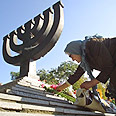
Kiev marks Babi Yar anniversary with new monument
New statue based on character from Anatoly Kuznetsov's novel, 'Babi Yar' unveiled on 68th anniversary of Nazi massacre of at least 33,771 Jews
Stone-faced Nazi soldiers wielding rifles marched Kiev's sobbing Jews to be killed in the Babi Yar ravine as passers-by held back tears in a dramatic theatrical performance meant to mark the anniversary of the massacre Tuesday.
On that day 68 years ago, the Nazis launched one of the most horrific killings of the Holocaust, gunning down at least 33,771 Jews over the course of two days - the number recorded by the executioners. In the ensuing months, the ravine was filled with about 100,000 bodies, among them those of non-Jewish Kiev residents and Red Army prisoners of the Nazis.
President Viktor Yushchenko, Jewish leaders and Kiev residents attended memorial events marking the event amid calls on Ukrainian authorities to do more to honor the victims of the tragedy. A plan by Kiev officials to build a hotel near the killing field drew sharp international criticism and was canceled just days after it was announced.
Organizers unveiled a new statue commemorating the massacre and at the same time paying tribute to Anatoly Kuznetsov, a deceased Soviet author who documented the tragedy in his book "Babi Yar" and was censored and persecuted by Soviet authorities.
The monument is a bronze statue representing a 12-year-old boy, the main character of the novel, who is reading an announcement posted on a brick wall ordering all Kiev's Jews to report to the authorities with their money, identification documents and belongings. Many Jews thought they were being shipped to a ghetto, but were gunned down instead.
Theatrical performance
The monument is located several kilometers away from the killing site in a Kiev district where the boy lived and where he first read the infamous poster, according to the book. The monument is funded by a Ukrainian businessman who wished to remain anonymous.
As part of the theatrical performance, groups of Jews, some clutching bags, others trudging behind a horse-drawn cart laden with their suitcases, fruit baskets and sewing machines followed Nazi soldiers with dogs to the killing site.
"On September 29, they assembled all the Jews at Babi Yar ... and they shot them there. It was horrible," said Nina Novikova, an elderly woman wearing a head scarf who lived in Kiev at the time of the tragedy and came to mark the anniversary.
"This was people being killed. It must be remembered," said Volodymyr Zhuravel, a Kiev architect who created the monument. "Any other nation could have been in the Jews' place. When people start demeaning other people, this is what happens."
Kuznetsov's son Alexei, who has not seen his father since age 9 when the author fled to Britain in 1969 and then died there 10 years later, called for preserving the memory of the victims. Alexei said his family was forced to end all contact with his father after his immigration because of harassment by KGB officials.
He assailed a recently annulled plan by Kiev authorities to erect a hotel near the killing site and called for a memorial complex to be built around Babi Yar. Last week, Mayor Leonid Chernovetsky reversed a decision by his allies in the city council to build the hotel after harsh criticism from Jewish groups worldwide.
Kuznetsov said the Soviet policy of concealing the tragedy for decades, which his father fought, has caused many to forget about it today.
"It was a mine planted in the Soviet times that exploded only today," Kuznetsov said.
Ukraine's chief rabbi, Yakov Blaikh, said that Babi Yar must be honored as both a Jewish and a Ukrainian tragedy. "It's very important that this be preserved in the memory of Ukraine which suffered so much" during the war, he said.










